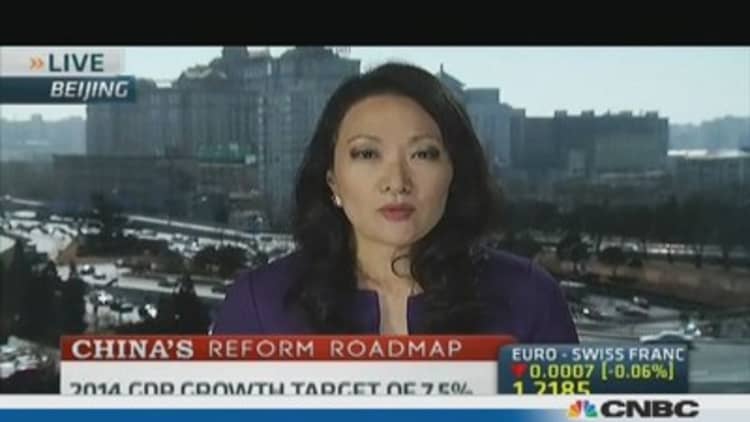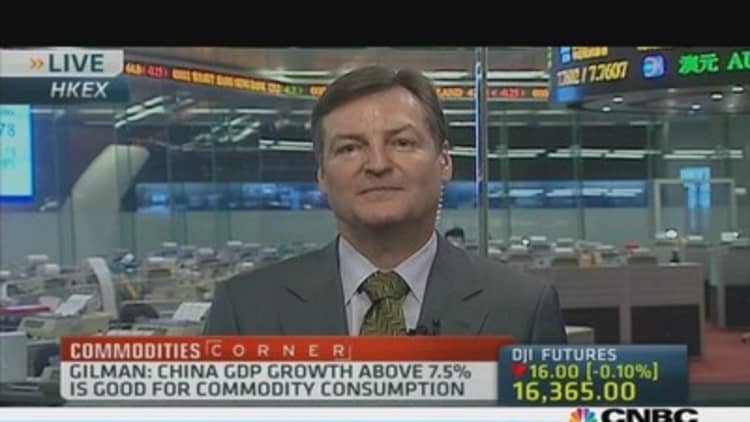Rather than blaming China's slowing economic growth on the usual property and debt suspects, some analysts are pointing the finger at the mainland's war on pollution.
"The negative impact of the anti-pollution campaign on economic growth has been quite visible," Claire Huang, an economist at Societe Generale, said in a note Monday.
"Polluting steel mills have been torn down, low-efficiency coal-fired boilers have been dismantled, and high-emission cars are being removed from the road," she said.
Read More China to 'declare war' on pollution, premier says
Huang expects the war on pollution will shave around 0.35 percentage point off gross domestic product (GDP) growth through 2017, with most of the haircut coming this year.
"Coal, iron and steel, cement and glass production account for around 16 percent of overall industrial output and 6 percent of GDP," she noted.
In March, Premier Li Keqiang "declared war" on pollution in response to increasing public outcry after a large number of days in 2013 when the air was considered hazardous. Li said efforts would focus on reducing hazardous particulates and shutting down outdated factories and energy production.

Whatever the cause, there's little doubt China's economic growth has slowed. In the first quarter, China's GDP grew 7.4 percent from a year earlier, slowing from 7.7 percent in the last quarter of 2013. Last year, it expanded 7.7 percent, its slowest rate since 1999 and down from 7.8 percent growth in 2012.
Some of the northern provinces where China's heavy industry is concentrated are seeing their worst growth performances since the 2008 financial crisis, Huang noted.
Read More Is China's growth slower because it's cleaner?
"The more polluted the region, the greater the slowdown," she said, with the six provinces discharging the most pollutants the biggest drags on national industrial production growth since September. Together, the six provinces accounted for 1.3 percentage points of the 1.7 percentage-point slowdown in industrial production growth over the past seven months, she said.
But she added, the medium-term outlook is brighter, with the capacity consolidation likely nearly completed by 2017.
Read More China smog makes capital 'barely suitable' for life: report
Also, while traditional heavy industries will take a hit, other sectors, such as new-energy vehicles and recycling, will benefit from the anti-pollution campaign, she said.
"In the long run, transforming traditional sectors is not necessarily a zero-sum game," she said, noting World Bank data indicates deploying energy-efficiency technologies in the cement and steel industries would save China around 60 billion yuan each year between 2008-2030.
To be sure, other economists aren't convinced the anti-pollution is having much of an impact on the economy.

"Pollution is obviously a handicap in the effect on workers and industries, but I don't think what the government is doing is having a big economic impact at this point," Alaistair Chan, an economist at Moody's, said. He noted the government has been shutting down polluting capacity since the lead up to the 2008 Olympics in Beijing.
Read More Clean technology – Silver lining to China's smog
Louis Kuijs, an economist at RBS, also wouldn't put pollution control high on his list of reasons for China's economic slowdown.
"People say that things like controlling pollution or enforcing labor legislation is bad for economic growth, but these types of changes in policy are unlikely to be very important in driving short-term changes," Kuijs said. "These types of policies matter, but I would not think they are the driving force for what's happened for the past six months or so."
Read More China's smog driving top foreign talent away: US business survey
Controlling pollution isn't the only reason for the factory shutdowns, with the need to reduce overcapacity also a key driver, he noted, adding the economic slowdown is likely more driven by the government tightening monetary policy, a slowing real estate sector and a weaker global economy weighing on exports.
Additionally, the shutdowns don't always mean production is declining, he said, noting that even with the steel mill closures, steel output is still growing.
—By CNBC.Com's Leslie Shaffer; Follow her on Twitter @LeslieShaffer1

